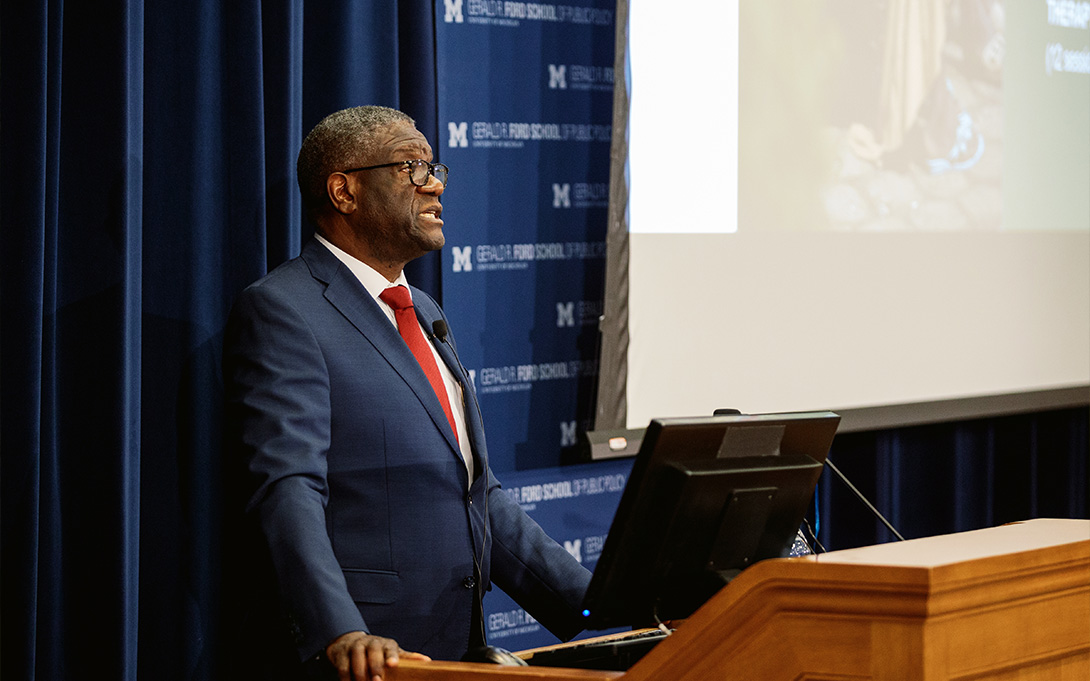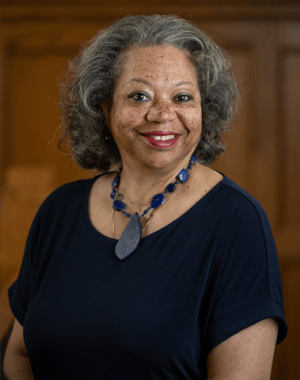
123,000 women were raped in the Democratic Republic of the Congo in 2023 - that’s one woman every 4 minutes. Dr. Denis Mukwege dedicated his life to helping victims of sexual assault in Congo, building a program of holistic healing and justice at Panzi Hospital and becoming a global advocate against rape as a weapon of war. At the Ford School, in a Gilbert S. Omenn and Martha A. Darling Health Policy Fund lecture, the Nobel Peace Prize Laureate discussed the underlying sociopolitical causes of sexual violence in Congo and his multifaceted approach to rebuilding communities in its aftermath: “What we are doing at Panzi is to try to transform the suffering into strength, to transform the life of a victim into a survivor.”
“The scourge of sexual violence continues to spread in all contemporary conflicts…Women and children are targeted by combatants to disorganize and subjugate the opposing communities,” Dr. Mukwege said. In the DRC, the intersections between sexual assault and broader geopolitical conflicts are clear, with greater rates of rape occurring in mineral-rich areas, and systematic public torture stunts intentionally designed to cause maximum damage to local communities. The humanitarian costs are staggering. “The destruction of the social cohesion, organizational capacity,…and children without parentage in the community – this is very dangerous,” said Mukwege. “It’s not destroying one person. It’s destroying the entire society, and the[re are] consequences also on the next generations.”
In light of the political, cultural, and economic factors that drive systematic rape in the DRC, Dr. Mukwege realized that real healing required much more than traditional medicine. Panzi Hospital’s holistic model of care is built on four pillars: medical services, psychological care, socioeconomic support, and legal assistance. Through his work, Dr. Mukwege has noticed that providing women with the opportunity to build trade skills and further their education is also an important part of restoring purpose in the wake of sexual violence, which often leaves victims rejected by their communities and feeling that “they are not human at all.” Mukwege elaborated further on the program’s success: “This is a really wonderful way to rebuild this social fabric, because in this situation, people don’t trust in one another. But when they come together, work together, put their money together, it’s just giving them this hope to believe in human beings.”
Despite the power of Panzi Hospital’s approach, Dr. Mukwege argued that long-term healing requires addressing the root cause of geopolitical instability in the Democratic Republic of the Congo: the exploitative extraction of natural resources. “Congo is a geological scandal for all its riches,” Mukwege lamented. “And if people are fighting, it’s especially because great powers, neighboring countries, and multinational corporations have plunged the Congo into organized chaos to plunder it more effectively.” To increase the DRC’s autonomy over its own natural resources, Dr. Mukwege advocated for binding international regulations to enforce transparent mineral trading, greater investment in local capacity to process and refine raw materials, and an African Union Free Trade Agreement.
In closing, Dr. Mukwege offered a reminder that the fight against rape as a weapon of war is “not [just] a fight for women or a feminist fight – it is really a fight for our common humanity.” Looking to the DRC’s future, Mukwege argued that pan-African solidarity is key to preventing rape as a weapon of war and advancing the struggle against ongoing neocolonialist exploitation: “What is needed really is to…understand that our future is bound together, and we need to fight for this future together.”
